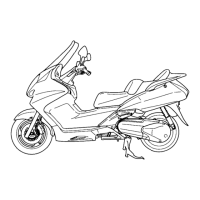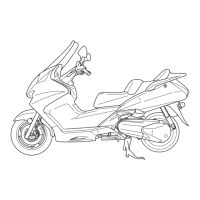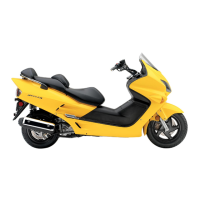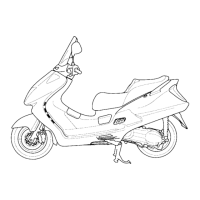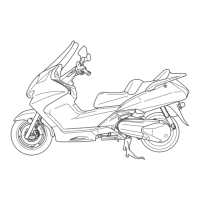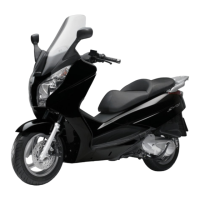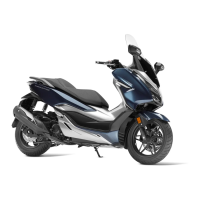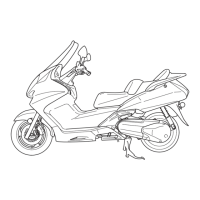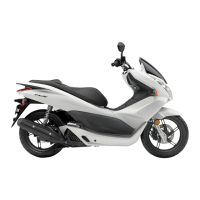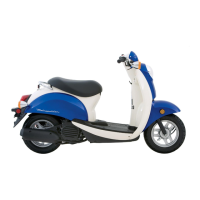Do you have a question about the Honda FJS600 A SILVER WING and is the answer not in the manual?
Information provided on labels attached to the scooter.
Messages preceded by safety alert symbols and signal words.
Essential safety information and guidelines for operating the scooter safely.
Detailed explanation of the scooter's dashboard instruments and indicator lights.
Information on the scooter's suspension system and adjustment procedures.
Details on the braking system, including CBS and ABS features.
Information on coolant type, capacity, and maintenance.
Details on fuel tank capacity and refueling procedures.
Recommendations for engine oil type, viscosity, and checking the oil level.
Information on tyre maintenance, air pressure, and wear.
Explanation of the ignition switch positions and their functions.
Information about the scooter's keys and key number plate.
Details on the Honda Ignition Security System (HISS) and its operation.
Description of controls located on the right handlebar.
Description of controls located on the left handlebar.
How to use the steering lock for security.
Operation of the parking brake lever.
How to open, lock, and secure the seat.
Procedure for adjusting the backrest for rider comfort.
How to use the helmet holder for securing a helmet.
Information about the center storage compartment, including its capacity.
Location and use of the document bag.
Operation of the trunk light.
Details on the right-side storage compartment and its load limit.
Details on the left-side storage compartment and its load limit.
Information about the 12-volt accessory socket and its capacity.
Procedure for adjusting the headlight's vertical aim.
Steps for performing a pre-ride inspection before operating the scooter.
Step-by-step instructions for starting the scooter's engine.
Guidelines for the initial running-in period to ensure future reliability.
Instructions and tips for safe and effective riding of the scooter.
Procedures for safely parking the scooter, including steering lock.
Advice and tips to prevent scooter theft.
Explains why regular maintenance is crucial for the scooter's performance and longevity.
Safety precautions specific to performing maintenance tasks on the scooter.
General safety precautions to follow when performing maintenance on the scooter.
Details the recommended maintenance intervals and tasks for the scooter.
Lists the tools included in the scooter's tool kit.
Explains the location of the frame and engine serial numbers.
Describes the location of the colour label for reference.
Instructions on how to service or replace the air cleaner element.
Instructions for checking and servicing the crankcase breather tube.
Detailed recommendations for engine oil type, viscosity, and level check.
Procedures for replacing various bulbs on the scooter.
Step-by-step guide for washing the scooter safely and effectively.
Advice on applying polish or wax for protection and appearance.
Steps to remove road salt residue to prevent corrosion.
How to clean and maintain painted aluminum wheels.
Instructions for cleaning the scooter's windshield.
Advice on maintaining the exhaust pipe.
Steps required to prepare the scooter for extended storage.
Procedures for safely bringing the scooter back into use after storage.
Key physical dimensions of the scooter.
Dry weight specifications for different models.
Fluid capacities for engine oil, transmission oil, fuel, and cooling system.
Engine specifications including bore, stroke, displacement, and idle speed.
Specifications for chassis geometry, tyre sizes, and suspension.
Details on primary reduction and final reduction ratios.
Specifications for lights, battery, and generator.
Information on main fuses and other fuse ratings.
